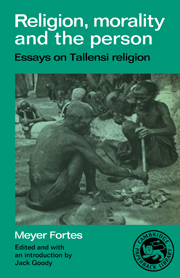Book contents
- Frontmatter
- Contents
- List of figures
- Introduction by Jack Goody
- 1 Divination: religious premisses and logical techniques
- 2 Prayer
- 3 Ritual festivals and the ancestors
- 4 Ancestor worship in Africa
- 5 Ritual and office
- 6 Totem and taboo
- 7 Coping with destiny
- 8 Custom and conscience
- 9 The first born
- 10 The concept of the person
- Endpiece: sacrifice among theologians and anthropologists
- Notes
- References
- Index
10 - The concept of the person
Published online by Cambridge University Press: 13 October 2009
- Frontmatter
- Contents
- List of figures
- Introduction by Jack Goody
- 1 Divination: religious premisses and logical techniques
- 2 Prayer
- 3 Ritual festivals and the ancestors
- 4 Ancestor worship in Africa
- 5 Ritual and office
- 6 Totem and taboo
- 7 Coping with destiny
- 8 Custom and conscience
- 9 The first born
- 10 The concept of the person
- Endpiece: sacrifice among theologians and anthropologists
- Notes
- References
- Index
Summary
Since everyone is acquainted with the famous essay by Marcel Mauss: ‘Une catégorie de l'esprit humaine: la notion de personne, celle de Moi’ (J. Roy. Anth. Inst., 1939), I shall not linger over it. I must, however, remind you that it was given in London, as the Huxley Memorial Lecture for 1938. I mention this for the personal reason that I had on this occasion the privilege and the exhilaration of meeting Mauss, for the first and only time, and also of attending his lecture. I had just got back from my second expedition to the Tallensi. In the afternoon before the lecture, Evans-Pritchard and I called on Mauss at his hotel. And I remember particularly sitting with him on the terrace and discussing his topic. He asked kindly about my field research and it was then that he made a comment which has remained engraved on my memory. Ethnology, he said, is like the ocean. All you need is a net, any kind of net; and then if you step into the sea and swing your net about, you are sure to catch some kind of fish. As for field work, he continued, shaking his head and laughing jovially, you say you have spent two and a half years with one tribe? Poor man. It will take twenty years to write it up.
Alas, Mauss' prophecy has been more than borne out. All the same, it is to the field work of that period in particular that I shall return in this paper.
- Type
- Chapter
- Information
- Religion, Morality and the PersonEssays on Tallensi Religion, pp. 247 - 286Publisher: Cambridge University PressPrint publication year: 1987
- 12
- Cited by



